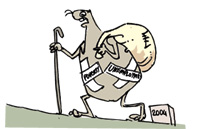| The Sunday Times Economic Analysis By the Economist | ||||||
| |
||||||
Should
we be content and complacent? Yet, in presenting the Annual Report the Governor mentioned that a 6 to 8 per cent annual growth was needed. In fact an 8 to 10 percent growth sustained over a decade or so is necessary to make any significant headway. This, as the Annual Report points out, is not likely to be achieved this year for several reasons. So we must look to 2006 to achieve even a 6 per cent growth. Whether we could achieve even a 6 per cent growth next year is conjectural, as we know neither the international economic outlook nor the developments in the country in 2006. What we have to digest are the more realistic facts before us that the economy grew at 5.4 per cent last year and that it is very likely that growth would dip below 5 per cent this year. The Central Bank has pointed out the extenuating circumstances affecting the economy and argued that in such a context the 5.4 growth was quite acceptable. The most significant conditions vindicating the growth rate were the political uncertainty in the first part of the year, the elections and change of government. A motley combination of parties forming a government initially with a slender majority added to the uncertain political climate in which the economy had to perform. Surprisingly these uncertainties do not appear to have had an effect in many areas of economic activity. In fact Colombo's Stock market performed well and the rate of investment in the economy rose to 25 per cent of GDP. Exports grew by 20 per cent and investment goods imports grew faster than consumption imports. The serious dent was in the balance of payments, where the sharp increase in oil prices resulted in an unprecedented trade deficit of US$ 2000 million. The impact of the oil price increase that continues and the balance of payments difficulties are still to show their impact on the economy. The adverse impacts through a rise in domestic prices, a higher budget deficit and slowing down of international economy will be felt only this year. The Central Bank was quite jubilant that the Country's per capita income had risen above the US$ 1000 mark. Regrettably, such a surpassing is not akin to a cricketer scoring a century or passing say 5000 runs in test cricket. The plain truth is that we are still one of the poorest countries in the world. Our per capita income of a thousand US Dollars compares very unfavourably with the per capita incomes of East and South East Asian countries. Malaysia, Indonesia, and Thailand have respectively per capita incomes that are four times, thrice and twice ours. There is no need to compare Sri Lanka to Singapore, Japan or Korea to make the point. Even China that for long was considered a poor country has surpassed our per capita income with its current high growth of nearly ten per cent and low population growth. It would take only seven years for China to double her GDP and about 9 years to double her per capita income. Even in comparison with the poorer countries in the South Asian region, our income has grown less rapidly than those of India for instance. Though India's per capita income is about one half of ours, it's growing very rapidly and likely to double in about ten years. The Maldives has a per capita income that is twice ours. Moreover, in spite of a low population growth in the country, our per capita income has increased only 101 US$ since 1999, when it was 899 US Dollars. At the rate of economic growth of about 5 per cent, it would take 14 years for Sri Lanka's GDP to double and about 17 years to double our per capita incomes. This leaves us still so much below the levels of most Asian countries. The plain truth is that the economy has a lot of catching up to do, but the political preoccupations, internal squabbling, a dysfunctional institutional set up and our social values are inimical to our development. A country that is fast becoming ungovernable, where law and order is deteriorating fast and reforms are impossible to implement, hardly provides the environment for higher growth. |
||||||
Copyright © 2001 Wijeya Newspapers Ltd. All rights reserved. |
 The
modest growth achieved last year has once again induced a tone of
complacency and satisfaction in the Central Bank Annual Report for
2004 that was released last week. Complacency and contentment with
our achievements have been one of the underlying reasons for the
continued low incomes, poverty and unemployment in the country.
This attitude, lacking a perspective of what's happening in the
rest of the world, has tended to keep us relatively underdeveloped.
The
modest growth achieved last year has once again induced a tone of
complacency and satisfaction in the Central Bank Annual Report for
2004 that was released last week. Complacency and contentment with
our achievements have been one of the underlying reasons for the
continued low incomes, poverty and unemployment in the country.
This attitude, lacking a perspective of what's happening in the
rest of the world, has tended to keep us relatively underdeveloped.